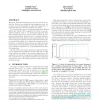Free Online Productivity Tools
i2Speak
i2Symbol
i2OCR
iTex2Img
iWeb2Print
iWeb2Shot
i2Type
iPdf2Split
iPdf2Merge
i2Bopomofo
i2Arabic
i2Style
i2Image
i2PDF
iLatex2Rtf
Sci2ools
CCS
2015
ACM
2015
ACM
Micropayments for Decentralized Currencies
Electronic financial transactions in the US, even those enabled by Bitcoin, have relatively high transaction costs. As a result, it becomes infeasible to make micropayments, i.e. payments that are pennies or fractions of a penny. To circumvent the cost of recording all transactions, Wheeler (1996) and Rivest (1997) suggested the notion of a probabilistic payment, that is, one implements payments that have expected value on the order of micro pennies by running an appropriately biased lottery for a larger payment. While there have been quite a few proposed solutions to such lottery-based micropayment schemes, all these solutions rely on a trusted third party to coordinate the transactions; furthermore, to implement these systems in today’s economy would require a a global change to how either banks or electronic payment companies (e.g., Visa and Mastercard) handle transactions. We put forth a new lottery-based micropayment scheme for any ledger-based transaction system, that can be ...
Related Content
| Added | 17 Apr 2016 |
| Updated | 17 Apr 2016 |
| Type | Journal |
| Year | 2015 |
| Where | CCS |
| Authors | Rafael Pass, Abhi Shelat |
Comments (0)

